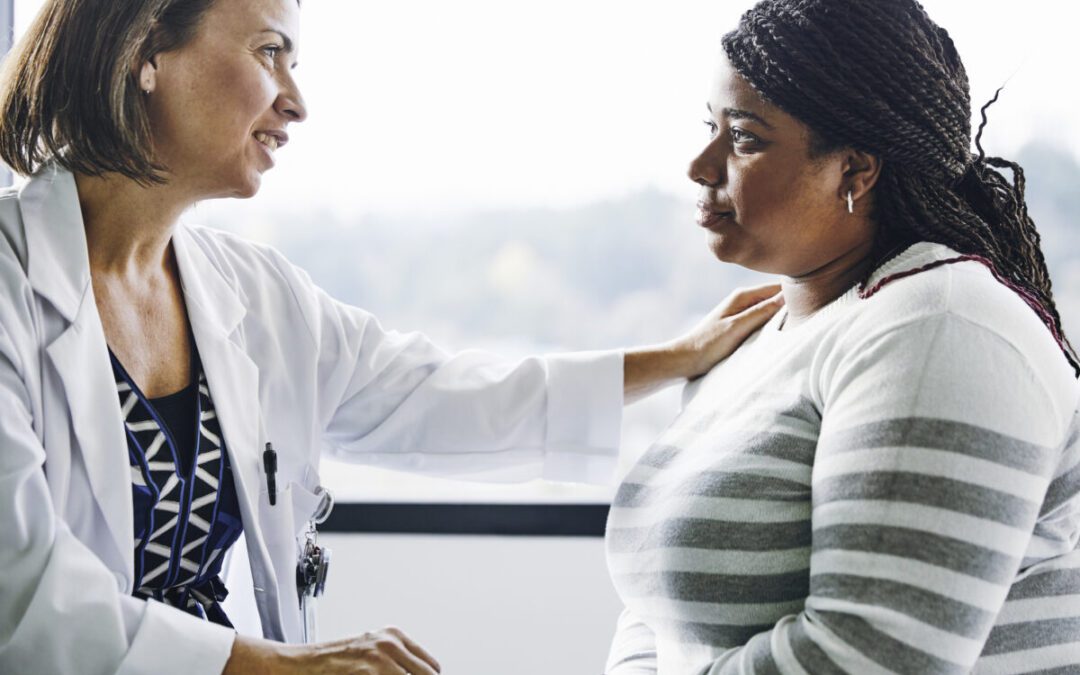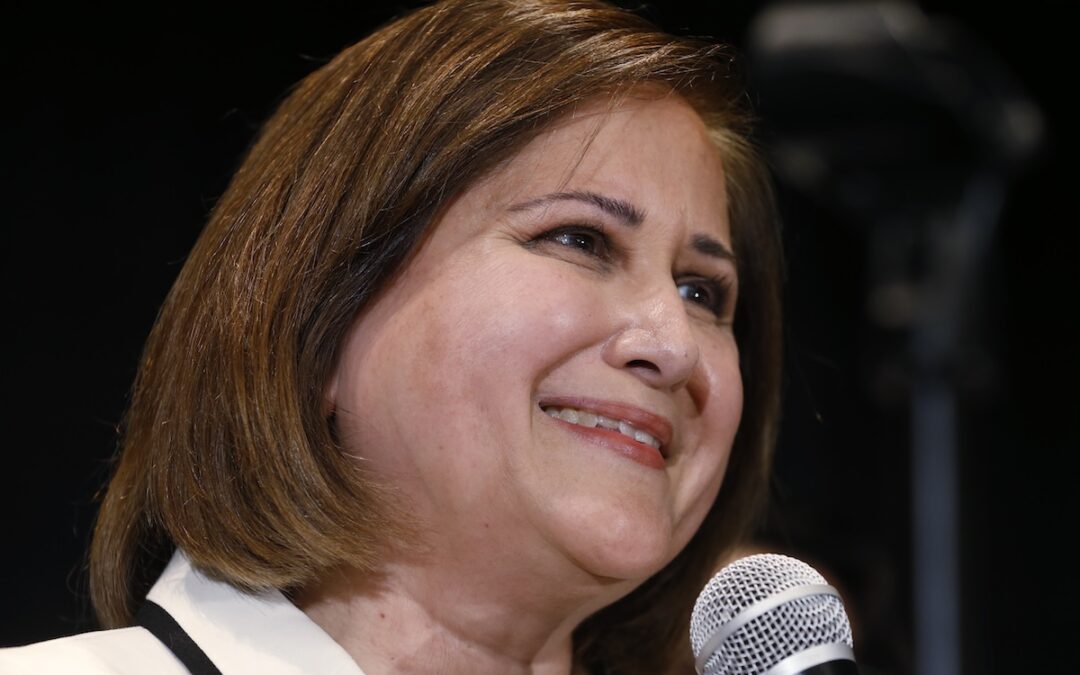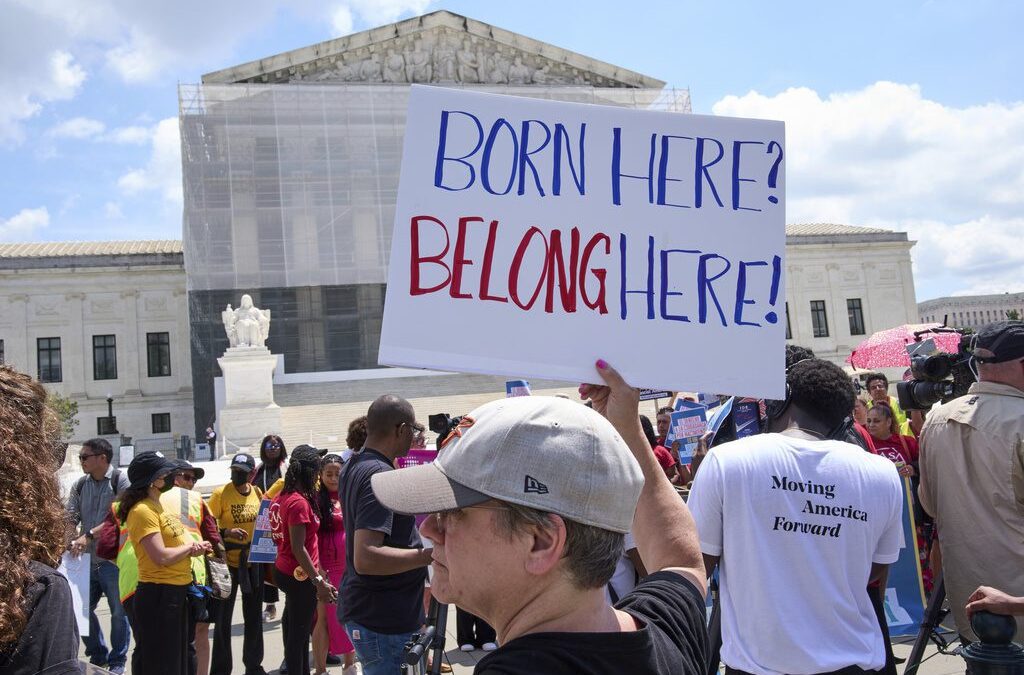
From left to right: Katie Baker, moderator, Jamie Lockhart, executive director for Planned Parenthood Advocates of Virginia, Leslie Mehta, Democratic candidate for House of Delegates (D-73), Dr. Susan Miller, and Janicka Fernandez, mother and storyteller. Photo credit: Americans for Contraception.
The event spotlighted Virginia’s stalled Right to Contraception Act and the broader fight against policies that could strip thousands of Virginians of coverage.
Janicka Fernandez still keeps the receipt in case anyone doubts her: $486.32 for just three months’ worth of birth control pills.
“What if we’re in a situation where women cannot afford this?” the Midlothian mother asked a crowd gathered Monday at the Clover Hill Library. “It’s hard enough to say, you know, ‘I’m not in a space where I can afford it.’ Now the complete right is being taken away, where you don’t even have a choice at all.”
Fernandez, who shared her personal experience at a roundtable hosted by Americans for Contraception, a national advocacy group that safeguards access to birth control and fights misinformation that threatens reproductive health, said the debate isn’t abstract.
“Taking away the right to birth control is like taking away the right to blood pressure medication,” she said. “It’s like meds. How can you say, ‘You can’t take these medications,’ when they’re not just needed, they’re preventative? And so it all goes in the same category.”
The roundtable came a few days after World Contraception Day, and highlighted Virginia’s stalled Right to Contraception Act, a measure sponsored by Democratic Senator and Lt. Gov. candidate Ghazala Hashmi and Delegate Marcia “Cia” Price. The bill, which would codify Virginians’ right to access FDA-approved contraception, has passed the state’s General Assembly twice, only to be vetoed by Republican Gov. Glenn Youngkin.
READ MORE: Gov. Youngkin vetoes contraception protections—again
“So we’ve been hitting that wall, but [Gov. Youngkin] really told us where he stood with his veto pen,” said Katie Baker, moderator for Americans for Contraception. “We’ve seen a lot of Republicans talking a good game, saying that they support this bill, when in reality, when push comes to shove and it’s time for them to actually put their name on the board, they’re not supporting it.”
Personal stories, public stakes
The conversation wasn’t just about affordability. For Leslie Mehta, Democratic candidate for the House of Delegates (D-73), contraception and fertility care were matters of survival.
“I’ve gone through the spectrum of reproductive care,” Mehta said, describing miscarriages, fibroids, two children conceived through in vitro fertilization (IVF), and a hysterectomy. “And making sure that folks have access to that care in a similar way is very important to me.”
RELATED: Leslie Mehta hopes ‘common sense’ bipartisan approach will win over voters in Virginia congressional contest
Mehta’s story emphasized a theme repeated throughout the event: that birth control and related services aren’t only about preventing pregnancy. They’re also used to treat conditions like endometriosis, fibroids, and polycystic ovary syndrome (PCOS)—illnesses that disproportionately affect Black women and women of color.
“Extremists who have asserted that life begins at conception,” Mehta said. “They have been targeting some of the IVF clinics, people who claim to be really interested in being pro-family, they are really threatening the ability of families like mine to be able to have children, if that’s what they choose to do.”
A federal collision
Speakers stressed that Virginia’s fight can’t be separated from national politics.
Jamie Lockhart, executive director of Planned Parenthood Advocates of Virginia, warned that cuts from Trump’s “One Big Beautiful Bill Act” signed into law in July have already begun dismantling care.
The new law not only blocks Medicaid patients from using Planned Parenthood, it also threatens coverage for an estimated 350,000 Virginians who rely on Medicaid or ACA plans. Unless Congress renews tax credits, many could face premiums rising by hundreds of dollars a month.
“What does this mean exactly?” Lockhart asked the crowd. “It means cancers will go undetected, STIs will go untreated, birth control will be harder to get, and the public health infrastructure of communities will break down. It means more than 5,700 Virginians will lose access to their trusted providers for birth control, STI testing and cancer screenings.”
The New York Times reported earlier this month that the Trump administration had ordered nearly $10 million worth of IUDs, birth control pills, and hormonal implants to be destroyed overseas, falsely labeling them “abortifacients,” medications or substances that induce an abortion. Days later, Belgian officials contradicted that account, saying the supplies were still sitting in a warehouse outside Antwerp—a sign of the confusion and geopolitical fallout surrounding the US withdrawal from international family-planning programs.
Inside the exam room
Retired Midlothian family physician Dr. Susan Miller added decades of perspective from the exam room.
“Birth control is the most effective way to decrease abortion, unwanted pregnancies, and poverty, which is often an outcome of an unwanted pregnancy,” she said. “Birth control decreases cancer risk and ovarian cysts, and treats lots of diseases.”
Miller, who began practicing shortly after Roe. v Wade was decided, had never worked in an era when abortion was illegal. Now, she said, the same logic used to unravel abortion rights is being directed at contraception.
“Politicians have no business in the exam room,” Miller said. “Women must have unfettered access to the full spectrum of birth control and reproductive care, [because] that there is no way for women to be equal without the ability to control their fertility.”
Looking to November
Delegate Price, the Virginia Right to Contraception Act’s sponsor, couldn’t attend the event due to illness. But her remarks, read aloud by Baker, served as the event’s final warning.
“The vast majority of Virginians and Americans support the right to contraception,” she said. “This is not some niche issue. It’s not a partisan issue. It’s a universally held value across racial, generational, geographic and political lines. The attack on contraception is an attack on our health, on our freedom and our communities.”
The urgency of the message resonated with attendees. Katina Moss, a Richmond resident, said she came not only to hear the policy arguments but to equip her community ahead of the general election November 4th as Virginians prepare to vote for a new governor, lieutenant governor, and all 100 House of Delegates seats.
“Not having that freedom over our bodies is very scary,” she said. “And so I want to be able to tell my community, the people that I know and love…so that they know how to vote, how to reach out to, and lobby their elected officials.”

Virginia lawmakers warn—contraception fight is far from over as Trump officials push to destroy $10M supply
Planned Parenthood’s “Bros for Repro” delegates say federal attacks on birth control could foreshadow risks for Virginians. Virginia lawmakers say...

In her own words: Why this Texas physician now helps women in Virginia
Dr. Lou Rubino is just one of many physicians who’ve left Texas as a result of the state’s multiple abortion bans—laws that prevent doctors from...

Ghazala Hashmi speaks out: ‘I’m so thankful my doctor could save my life’
The Democrat running for lieutenant governor of Virginia reveals she had two dangerous miscarriages—and pledges to protect reproductive rights for...

Spanberger makes reproductive rights a cornerstone of her run for governor
She's pledging to defend contraception access and expand abortion protections. Virginians got to learn a little more about the Democrat running for...

Supreme Court limits nationwide injunctions, but fate of Trump birthright citizenship order unclear
WASHINGTON (AP) — A divided Supreme Court on Friday ruled that individual judges lack the authority to grant nationwide injunctions, but the...

Several hospitals in rural Virginia are at risk of closing if Trump’s ‘big beautiful bill’ passes
Studies reveal that at least half a dozen rural hospitals and health centers in Virginia will be forced to close their doors if the Trump...





